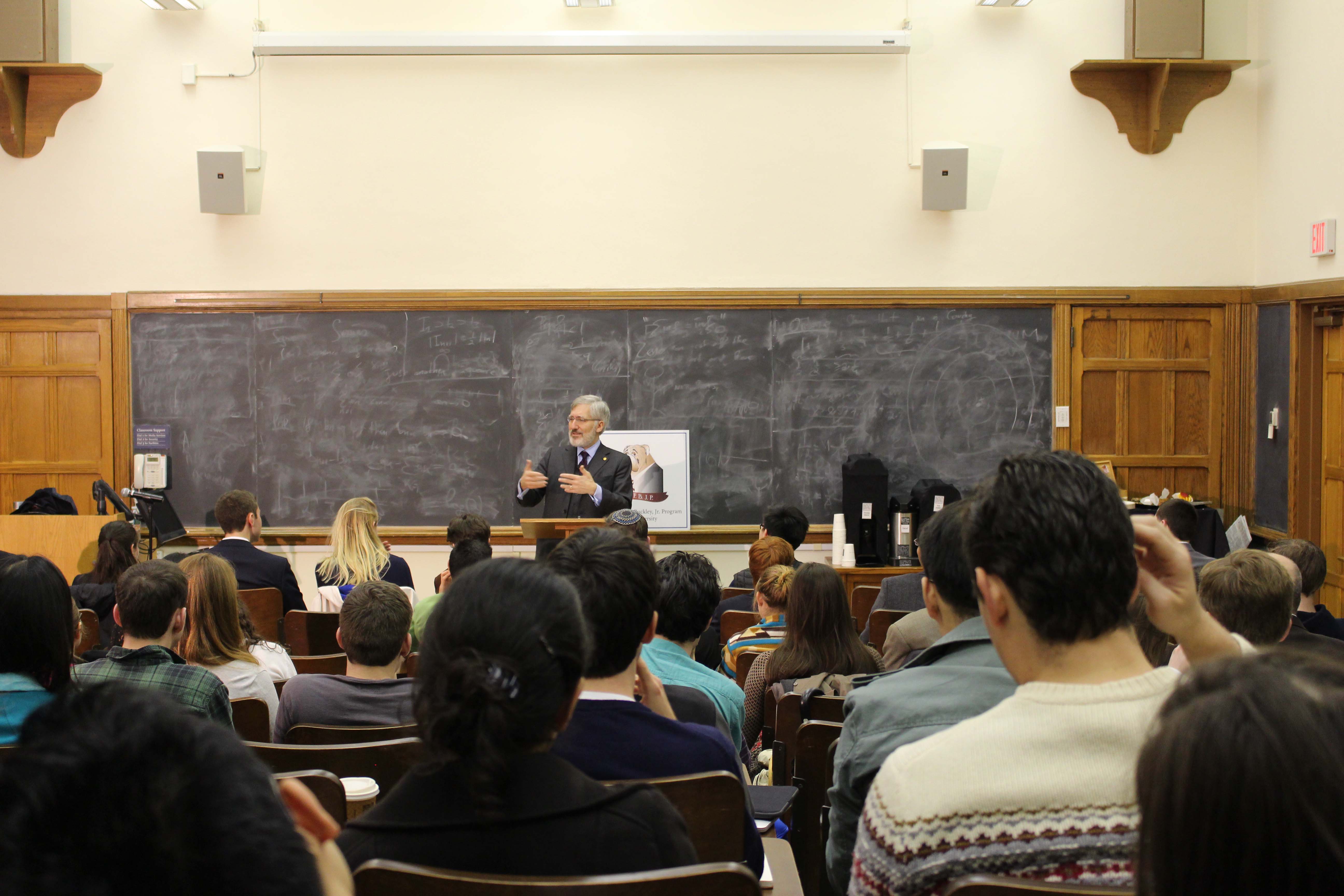
Robert P. George — noted legal philosopher, conservative thinker and Princeton professor of jurisprudence — came to campus Wednesday to speak to Yale students on the topics of academic freedom and liberal arts ideals. During his two-hour talk, George described the dangers modern universities face from intellectual homogeneity, and he called on students to rigorously assess their own positions.
The talk, which was hosted by the William F. Buckley Jr. Program at Yale and attracted roughly 60 attendees, focused especially on recent debates surrounding the state of free speech on college campuses — a debate in which Yale took center stage after students protested a controversial email from a University administrator. George, who has worked as an informal advisor to several Republican presidential candidates and who taught Sen. Ted Cruz during his time at Princeton, particularly denounced “group think,” his term for following an established orthodoxy and avoiding true debate. He argued that liberal arts institutions are founded for the express purpose of seeking and loving truth.
“There is a truth, or at least we have to suppose there is a truth — that’s the goal of our pursuit, and so we want to get it, or as near to it as we can possibly get,” he said.
The danger of “group think,” George said, is not that it is unfair, but rather that it is destructive to the very purpose and mission of a liberal arts university. Without an informed discourse, an understanding of one’s own position cannot be achieved, he added.
“Even if the opinions students happened to have acquired in an environment of political correctness happen to be true, students’ ignorance of the arguments advanced by serious dissenters will prevent them from understanding the truth as deeply as they should,” he said.
George gave multiple examples of the negative effects of intellectual homogeneity in his own experience as an academic at Princeton. George cited a story a liberal colleague of his shared with him, in which a faculty selection committee sought to disqualify a candidate based on his views on abortion, as a particularly flagrant violation of the “academic virtues” that institutions of higher education should hold and foster. According to George, this kind of homogeneity hurts not only conservative college students in the minority, but everybody in the university.
His antidote to “group think” and “campus illiberalism,” he said, is intellectual diversity. He proposed two measures to achieve such diversity: firstly, that there be no discrimination on college campuses based on viewpoint; and secondly, that universities actively encourage their students to be “rigorously self-critical.”
George is recognized as one of America’s most influential conservative thinkers, and his ideas have had notable impact on Republican Party policy. His critics have often pointed to his hard-line views opposing abortion and same-sex marriage. Throughout the talk, George frequently reaffirmed and alluded to his positions on these topics, citing his colleagues’ intolerance of contrary opinions on these issues as evidence of an environment hostile to intellectual diversity.
At Princeton, George is known for engaging opposing viewpoints in the classroom. He teaches a popular freshman seminar, “Great Books: Ideas and Arguments,” alongside prominent African-American scholar and public left-wing intellectual Cornel West. According to George, the success of his seminar hinges on the intellectual diversity he and his colleague bring to the discussion table. West was also on campus Wednesday evening, participating in a panel discussing “The Politics of Higher Ed in 2016.”
Student opinion on George’s talk was generally positive.
Alaric Kapf ’19 found George’s talk enjoyable and charitable to dissenting opinions. When asked if he thought the talk was out of touch with the current spirit of Yale’s campus, he said that he thought “the campus was out of touch with it.”
“The two are definitely not in alignment,” Kapf added.
Faculty attending the talk seemed to sympathize with George’s concern about the lack of rigor in intellectual dialogue on college campuses.
Sociology professor Margarita Mooney ’95 said she found George’s observations reflected in her own experience.
“I see a type of contradiction in my colleagues, where they are willing to advocate for positions they can’t justify are true, but yet are also willing to use political and economic pressure to enact,” Mooney noted.
According to The New York Times, George once represented Mother Teresa before the Supreme Court in an amicus brief seeking the overturning of Roe v. Wade.







